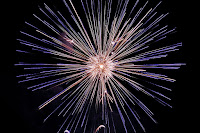Celebrating 4th of July
 A couple of years ago, I was in a small mid-western resort town on July 4th and thousands of tourists (mostly from elsewhere in the state) had turned out to see the fireworks. Trucks streamed in from all the nearby little towns and farms. The atmosphere was festive. There was benevolence all around. The red-white-and blue was respected, not as a symbol of something above us on an altar, but as a symbol of who we are. Not on a pedestal to be saluted -- though that too -- but, in casual clothing, in funny head-dress, in flashing lights to be worn for the evening.
A couple of years ago, I was in a small mid-western resort town on July 4th and thousands of tourists (mostly from elsewhere in the state) had turned out to see the fireworks. Trucks streamed in from all the nearby little towns and farms. The atmosphere was festive. There was benevolence all around. The red-white-and blue was respected, not as a symbol of something above us on an altar, but as a symbol of who we are. Not on a pedestal to be saluted -- though that too -- but, in casual clothing, in funny head-dress, in flashing lights to be worn for the evening. All around was a feeling of family and of sharing a value. Very few cops in sight, and yet the thousands self-organizing in very orderly ways. If you asked those people, in that moment, if freedom was their top value, if the individual is important, if we should recognize the individual's right to his own life and happiness...you'd probably find lots of agreement. It's all good, but it is mostly emotional.
As you peel away and understand the intellectual roots, contradictions appear. I won't say the emotions are unfounded, that there is no "there there". When Hollywood makes a movie of a maverick going up against the world and winning, huge audiences love the theme. It is who they are: sometimes, on some topics, and in some emotional states.
Nationalism is dangerous when it goes beyond a general benevolent celebration of sharing good values like freedom and individualism. It usually does, and we have a good person like Robert E. Lee rejecting Lincoln's attempt to get him to lead a Union Army, even though he could "anticipate no greater calamity for the country than dissolution" and thought "secession is nothing but revolution". Why? For "honor" -- which really translates to honoring a convention where you are loyal to your home state.
Throw in ideas about the role of government in helping people in all sorts of situations. Thrown in ideas about inequality being caused by oppression. And faulty ideas about economics. And suspicions about bankers running the world. Add back the occasional cheering of the maverick who defies authority; but also add back the desire to control other people's behavior: if they're gay, or marrying someone of another race, or smoking pot, or even having a beer when they're 20 years and 11 months!
That is the contradiction that is America.
Still, you should feel free to choose what emotions you wish to invest in symbols like the flag. You do not have to salute a flag and think you're saluting a tortured contradiction that is eating itself from the inside out :) . You can salute it for the right reasons, or for what you think it once stood for.
Here's Frederick Douglas, speaking on the occasion, about a decade before the civil war: "This Fourth July is yours, not mine. You may rejoice, I must mourn." It's worth reading, particularly if your first reaction is to dismiss it. Was he wrong? Was he right for his time and not for ours? Or, does his admonition still stand?
"Should we celebrate 4th of July?" I don't think that's the right question. I think that -- right from Day 1 -- there were people who should have been celebrating it. Not just Americans.And, not all Americans.
I think the question should not be addressed to a group, but to each individual: "Can you celebrate July 4th without hypocrisy?" I think this is the greal lesson from Douglas's speech.
And, each individual may honestly answer "yes", even if the rest of the world cannot.

Comments
Post a Comment